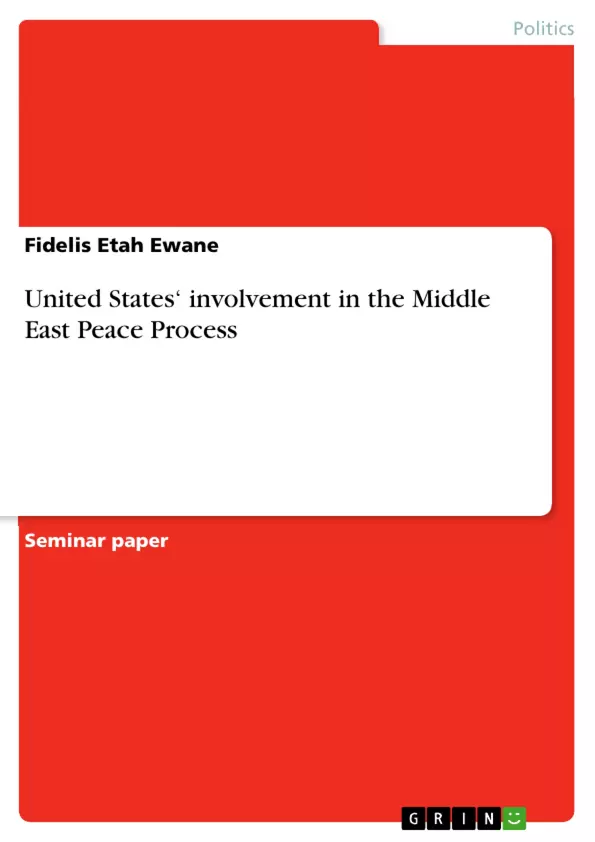The Israeli-Palestinian conflict is one of the greatest conflicts of our time, especially as no peace effort has proven to be really effective. From the creation of the state of Israel in 1948, the history of the Palestinians and the Israelis is defined by perpetual conflict with one another. Israelis and Palestinians are entangled with each other and alienated from one another in almost every imaginable way. From 1948 to 1973, Arabs and Israelis engaged in four great wars with heavy casualties on both sides. The United States of America has deployed enormous resources as peace broker in this conflict partly because of its special relationship to Israel and partly because of its economic and strategic interests in the Middle East. Successive American administrations have maintained the tradition of mediation, but the most genuine commitment was made by the Clinton administration, culminating in the signing of the Wye River Memorandum in 1998. This mediation effort notwithstanding, peace between the Israelis and Palestinians is still an imaginary luxury and violence remains the order of the day between the two peoples. The aim of this review paper is to analyze the lack of bold leadership on the part of the United States of America in brokering a lasting peace deal between Isrealis and Palestinians. This paper is divided into three parts and the first part retraces the history of the conflict from the creation of the state of Israel in 1948 to the Yom Kippur war of 1973. The second part examines the main issues of contention in the peace process, beginning with the United States’ lack of neutrality, Israeli Security concerns, the refugee problem, the status quo of Jerusalem, the issue of the occupied territories and the Palestinian quest for self determination. The last part proposes policies to the US State Department that can lead to a meaningful and lasting peace in the Middle East. The paper recommends the US to adopt neutrality as mediator, proceed to the creation of a viable Palestinian state and press for the enforcement of previous agreements that will allow for the safe return of refugees, promote apology and reconciliation between Arabs and Jews and encourage shared responsibility over Jerusalem. Rational choice is used to analyse US policy choices, whereas the theory of Prisoner’s Dilemma Game is used to analyse Israeli-Palestinian choice of partner.
Inhaltsverzeichnis (Table of Contents)
- 0 INTRODUCTION
- HISTORICAL BACKGROUND
- CHALLENGES TO PEACE
- A/ ATTITUDE OF THE US
- B/SECURITY CONCERNS OF ISRAEL
Zielsetzung und Themenschwerpunkte (Objectives and Key Themes)
This paper analyzes the lack of decisive leadership by the United States in mediating a lasting peace agreement between Israelis and Palestinians. The focus is on the historical context, the main obstacles to peace, and potential policy recommendations for the US State Department to achieve a meaningful and lasting peace in the Middle East.
- Historical background of the Israeli-Palestinian conflict
- Challenges to peace, including US policy and Israeli security concerns
- US policy choices and their impact on peace negotiations
- The role of rationality and strategic decision-making in the conflict
- Potential policy recommendations for the US to achieve a lasting peace
Zusammenfassung der Kapitel (Chapter Summaries)
- 0 INTRODUCTION: Introduces the Israeli-Palestinian conflict, its history, and the importance of the United States as a peace broker. Highlights the paper's objectives and structure, outlining the historical background, challenges to peace, and policy recommendations.
- HISTORICAL BACKGROUND: Traces the history of the conflict from the British Mandate over Palestine to the creation of Israel in 1948. Explores key events, including the Balfour Declaration, the Arab Revolt, and the partition plan adopted by the United Nations.
- CHALLENGES TO PEACE: Examines various factors that hinder peace efforts, including:
- A/ ATTITUDE OF THE US: Discusses the US's special relationship with Israel and its lack of neutrality in mediating the conflict. Analyzes how this has alienated Palestinians and hampered peace initiatives.
- B/ SECURITY CONCERNS OF ISRAEL: Explores the Israeli perspective on security, highlighting their reluctance to create a Palestinian state due to concerns about the potential risks.
Schlüsselwörter (Keywords)
The paper focuses on the Israeli-Palestinian conflict, Middle East peace process, US foreign policy, mediation, security concerns, Palestinian state, peace negotiations, rationality, Prisoner's Dilemma, policy recommendations.
Frequently Asked Questions
Why has the US involvement in the Middle East peace process been criticized?
Critics point to a lack of neutrality and a special relationship with Israel that often alienates Palestinian interests during negotiations.
What are the main obstacles to a lasting peace deal?
Key issues include Israeli security concerns, the status of Jerusalem, the Palestinian quest for self-determination, and the refugee problem.
What was the Wye River Memorandum of 1998?
It was a significant mediation effort by the Clinton administration aimed at implementing earlier agreements between Israel and the PLO.
How is "Rational Choice" theory used in this analysis?
It is used to analyze why the US and Middle Eastern actors make specific policy choices based on their strategic and economic interests.
What policies does the paper recommend for the US?
The paper suggests adopting true neutrality, supporting a viable Palestinian state, and enforcing agreements regarding the return of refugees.
- Quote paper
- Fidelis Etah Ewane (Author), 2010, United States‘ involvement in the Middle East Peace Process, Munich, GRIN Verlag, https://www.grin.com/document/163727



